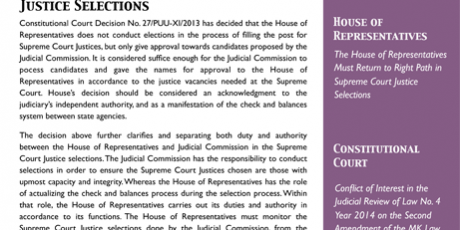House of Representatives
The House of Representatives Must Return to Right Path in Supreme Court Justice Selections
Constitutional Court Decision No. 27/PUU-XI/2013 has decided that the House of Representatives does not conduct elections in the process of filling the post for Supreme Court Justices, but only give approval towards candidates proposed by the Judicial Commission. It is considered suffice enough for the Judicial Commission to pocess candidates and gave the names for approval to the House of Representatives in accordance to the justice vacancies needed at the Supreme Court. House’s decision should be considered an acknowledgment to the judiciary’s independent authority, and as a manifestation of the check and balances system between state agencies.
The decision above further clarifies and separating both duty and authority between the House of Representatives and Judicial Commission in the Supreme Court Justice selections. The Judicial Commission has the responsibility to conduct selections in order to ensure the Supreme Court Justices chosen are those with upmost capacity and integrity. Whereas the House of Representatives has the role of actualizing the check and balances process during the selection process. Within that role, the House of Representatives carries out its duties and authority in accordance to its functions. The House of Representatives must monitor the Supreme Court Justice selections done by the Judicial Commission, from the beginning of the process to the end. The monitoring activity done is based on supervisory functions towards the implementation of Laws possessed by the House of Representatives.
If the existing selection mechanism is considered not yet able to produce quality Supreme Court Justice candidates, the House of Representatives has the authority to conduct corrections or alterations towards laws regulating on the Supreme Court Justice selections;.based on the implementation of the legislative function.
As a response towards the Constitutional Court Decision, the House of Representatives should immediately initiate the amendments in provisions of Law No. 3 Year 2009 on the Supreme Court, and Law No. 18 Year 2011 on the Judicial Commission. Furthermore, the House of Representatives must also carry out amendments towards House of Representatives Regulation No. 1 on the House of Representatives Standing Orders, which still include the fit and proper test mechanism in order to make decisions on the approval of Supreme Court Justice candidates proposed by the Judicial Commission. (FN)
Constitutional Court
Conflict of Interest in the Judicial Review of Law No. 4 Year 2014 on the Second Amendment of the MK Law
The Government Regulation in Lieu of Law (Peraturan Pemerintah Pengganti Undang-Undang / Perppu) No. 1 Year 2013 on the Second Amendment of the Law on the Constitutional Court (UU Mahkamah Konstitusi / MK Law) has been endorsed by the House of Representatives to become a Law (Law No. 4 Year 2014). The controversy in the amendments of the MK Law continues, despite the approval of changes by the House of Representatives. Several lawyers, led by Muhammad Asrun, consider the law to have violated the constitution, primarily on the part of limiting ex-politician nominees for Constitutional Court Judges.
Despite the substantive argument, it is important for the Constitutional Court to show judicial restraint to not further processing the judicial review due to conflicts of interests. In this case, a conflict of interest occurred because the disputed object is related to the Constitutional Court’s status as an institution. Previously, the Constitutional Court had also decided on a similar case in case Number 005/PUU-IV/2006 on the Law on the Judicial Commission. In the case, the Constitutional Court abolished the power of the Judicial Commission in supervising Supreme Court Judges and Constitutional Court Judges; not a part of the petition request. The decision has proven to be fatal; the absence of supervision from an external party has led to corruptions conducted by Akil Mochtar, former Chief Justice of the Constitutional Court who allegedly received bribes.
It is strategically important for the Constitutional Court to restrain itself in deciding the case, in order to prevent further damage to its reputation. Additionally, it is also a good time to overturn the Constitutional Court’s argument in Case Number 005/PUU-IV/2006 and uphold the most primary procedural law principle; that judges cannot decide on cases one has interests in (nemo judex idoneus in propria causa). (GAT)

